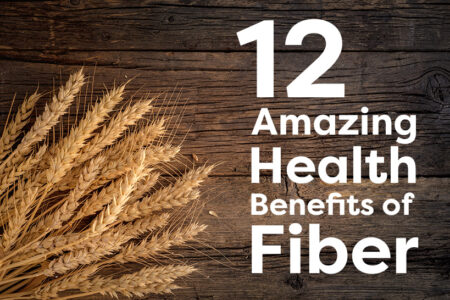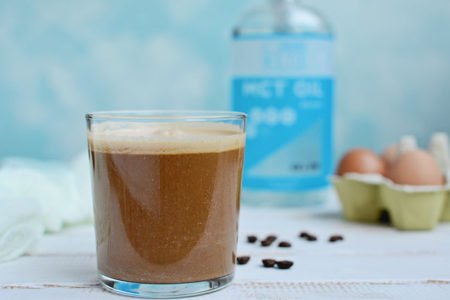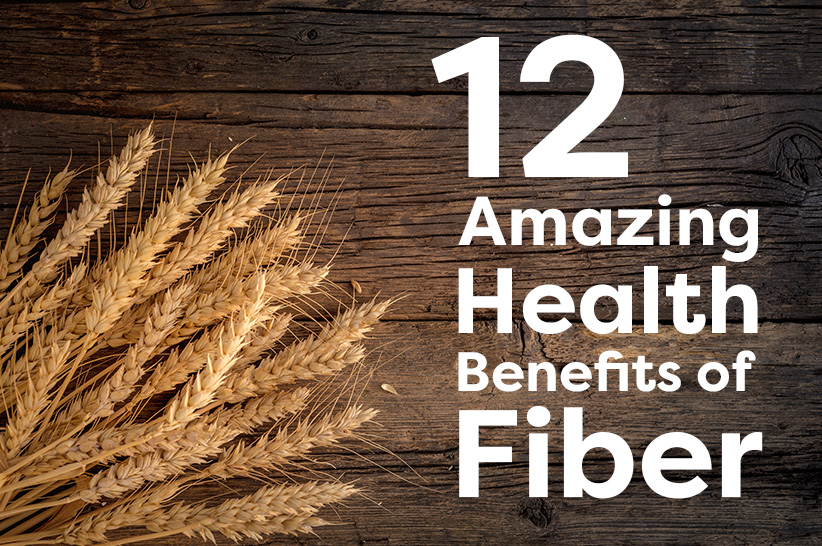We all know we should eat more fiber. But in case you need more convincing, here are 12 amazing benefits of fiber you’ll get from this dietary change.
A diet rich in dietary fiber is a healthy one, we all know that. Yet, most people are eating only a half to a third of the recommended daily amounts, according to recent reports 1. If that’s you, this means you’re seriously missing out on many of its amazing health benefits.

Fiber refers to some forms of complex carbs found in plants, like polysaccharides, pectins, cellulose, and resistant starch. It differs from other types of carbs in that digestive enzymes can’t break it down, which is why it has limited to no impact on blood glucose levels 2. And while your body can’t digest it — it can benefit from it!
The benefits of fiber start in the digestive tract, where it helps move food, feed bacteria, and aid in the production of chemicals that keep your colon healthy. Fiber benefits extend beyond the gut, however, and all the way to metabolic, heart, and brain health. You can experience all of this no matter if you’re following a low-carb or high-carb diet.
To get the benefits of fiber, you need to make sure you’re eating enough of it. The Institute of Medicine (IOM) recommends 25g/day for women and 38g/day for men. Consuming both soluble fiber like tapioca and insoluble fiber is also necessary.
Convinced yet? Below are 12 benefits of eating fiber to motivate you to up your daily intake.
1. Improved gut motility
Most benefits of dietary fiber happen in the colon, and improved gut motility — aka having regular bowel movements — is one of them. Psyllium husk is a great example and that’s often used to relieve constipation.
These types of fibers — which are usually soluble — work by absorbing water and increasing stool bulk. An increase in stool bulk stimulates the walls of the colon, leading to more frequent bowel movements. However, many other theories on how fiber helps relieve constipation exist, with one saying that short-chain fatty acid (SCFA) from bacterial fermentation of fiber influences motility.
2. Healthier microbiota

Your gut is home to trillions of microbes, collectively known as microbiota. While your body can’t break down fiber on its own, these friendly microbes help you with this. Their breakdown of dietary fiber, which mostly occurs in the colon, produces metabolites like SCFA that keep the intestinal wall healthy 3.
For a healthy and diverse microbiota, the importance of fiber can’t be stressed enough. Pre-clinical and human studies both show that the better the fiber intake, the healthier the microbiota 4. Fibers that boost microbial number and diversity are known as prebiotics, and they include fructans and galacto-oligosaccharides from foods like onions, artichokes, and seaweeds.
3. A disease-free GI tract
Your doctor is likely to recommend a high-fiber diet if you ever find yourself dealing with GERD, ulcers, IBS, diverticulitis, constipation, hemorrhoids, and similar gastrointestinal problems. That’s because there’s some evidence fiber plays a role in their prevention 5.
While we don’t know the exact causes of these gastrointestinal disorders, there’s a real possibility they’re linked to dysbiosis. Since fiber boosts healthy bacteria in the gut, it may indirectly help prevent and treat these conditions this way. Inflammatory conditions of the GI tract also benefit from the SCFA produced by gut bacteria because they reduce acidity in the digestive tract and support healing 6.
4. Weight loss

When people are put on a low-calorie diet, studies show they’re more likely to lose weight if said diet is also high in fiber 7. They’re also more likely to stick to their diet long-term. And the reason for this has to do with fiber’s satiating properties and its interference with macronutrient digestion.
Fiber absorbs water, creating bulk in your digestive system that slows down digestion and leads to feelings of fullness. Its absorptive properties also interfere with your body’s digestion of protein, digestible carbs, and fat, meaning you’re absorbing fewer calories. Soluble fiber. Which is found in avocados, Brussels sprouts, nuts, seeds, and berries, is most effective for weight loss.
5. Metabolic health
One of the biggest benefits of a high-fiber diet is greater metabolic health. In a study of over 80 overweight adults with metabolic syndrome, insulin sensitivity was 25% higher in those put on a high-fiber diet compared to a high-protein one 8.
Fiber lowers the glycemic index of plant foods, which can help with glycemic control and insulin sensitivity down the line. Previous studies linked soluble fiber to these benefits. But newer and large studies show that insoluble fiber reduces a person’s risk of developing diabetes the most 1. Why this is the case is a bit of a mystery, though. Sources of insoluble fiber include tomatoes, peppers, and green beans.
6. Lower cholesterol
Soluble fibers also seem to have the ability to lower cholesterol levels 5. Intake of 9-30g of fiber is associated with around 10% lower LDL levels, which can help reduce your risk of heart disease.
Soluble fibers — which are found in a wide range of vegetables, nuts, and seeds — bind to bile acids in the small intestine and help boost their excretion. Increased excretion of bile acid forces the liver to draw it from the blood, reducing its levels. Furthermore, fermentation of these fibers in the colon lead to the production of propionate, an SCFA that curbs cholesterol production.
7. Reduced heart disease risk

A review of the latest research on fiber and heart disease found that fiber is strongly associated with a lower risk of cardiovascular disease and coronary heart disease 9. So, what does fiber do to help your heart and blood vessels stay healthy?
We’ve already mentioned it leads to weight loss, better insulin sensitivity, glycemic control, and lower cholesterol levels — all things good for the cardiovascular system. Fiber can also boost metabolic health and lower blood pressure, which further brings your risk of developing a heart problem down.
8. Less inflammation
Chronic, low-grade inflammation underlies many chronic diseases. Luckily, boosting your fiber intake can help. Fiber lowers inflammation mainly by boosting butyrate levels, according to some theories 1.
Butyrate, also known as butyric acid, is an SCFA produced by colonic bacteria through the fermentation of soluble fiber. It protects the intestinal wall from damage, which prevents harmful substances from penetrating it and causing inflammation. This inflammation-lowering effect goes beyond the gut, however, as butyrate inhibits the production of pro-inflammatory cytokines.
9. Better mental health
Depression is one of many chronic diseases linked to low-grade inflammation 1. Since dietary fiber lowers inflammation, it’s no wonder that some observational studies found a link between higher fiber intake and lower incidences of depression 10.
Besides lowering inflammation, fiber’s influence on the diversity of gut microflora may also explain its mood-enhancing effect. Gut microbes facilitate the production of serotonin, tryptophan, and γ-aminobutyric acid via the gut-brain axis — all are important for mental health. Some bacteria can directly produce tryptophan, which is a precursor to serotonin production.
10. A stronger immune system
Your intestines have something called gut-associated lymphoid tissue (GALT), which consists of immune cells and protects your whole body from pathogens. Research has long ago found that some prebiotic fibers (e.g. inulin and oligofructose) increase the number of immune cells in GALT 11.
Researchers aren’t sure why prebiotics seem to have this effect, but gut bacteria or their byproducts penetrating GALT and stimulating the production of immune cells is one explanation. Besides that, fiber boosts the immune system by keeping inflammation low as chronic inflammation can affect immunity.
11. Lower risk of colorectal cancer
There’s growing evidence that up to 47% of colorectal cancer cases can be prevented with lifestyle changes — like boosting your fiber intake 12.
Cancer is usually a result of damaged DNA, either from chronic infections, inflammation, and free radical damage. Because fiber lowers inflammation and boosts the health and functioning of the digestive tract, it also reduces your risk of malignancies. Plus, we’ve already said it can also boost your immune system, and a strong immune system also helps prevent cancer.
12. A longer life
And lastly, all these health benefits you get from fiber can mean a longer, healthier life. Looking at cohort studies, there seems to be an 11% lower risk of dying early with every 10g of fiber per day 1.
Fiber lowers whole-body inflammation, reduces heart disease risks, boosts metabolic health, and does so much more for your body, so it’s only logical to assume you’ll live longer if you add more of it to your diet.
Takeaways
Fiber is one of those good-for-you carbs you should make sure you’re getting enough of on your diet, be it low-carb or something else. It isn’t essential like some other nutrients, but your body seems to thrive when you consume it on a regular basis.
From better overall gut health, metabolic health, and reduced chronic disease risk, you have so many reasons to pay more attention to how much fiber you’re eating. You could get most of it directly from food, but supplements can work as well when life gets in the way.
Oh, and make sure to drink your fluids with fiber and don’t have more than 70g per day as this can cause digestive problems.










![Juicing for Weight Loss: Everything You Need to Know [Plus Recipes]](/wp-content/uploads/2019/08/Juicing-for-Weight-featured-image.jpg)









Big thank you to Sofia Norton of the amazing article and to Kiss My Keto for the great community they have put together. Keto has done a lot for my struggles with my weight. I was told by my doctor that if I didn’t lose some weight safely in a timely fashion that I was going to develop much more serious problems than I already had. Heart disease, cholesterol and high blood pressure are big problems on both sides of my family. I found that his diet worked wonders for me and I hope to share it with all of you.
https://mmini.me/CustomKetoDietHaup
Thank you so much for sharing that, Billey! It’s amazing to hear people’s journey and we are very happy to be part of it.